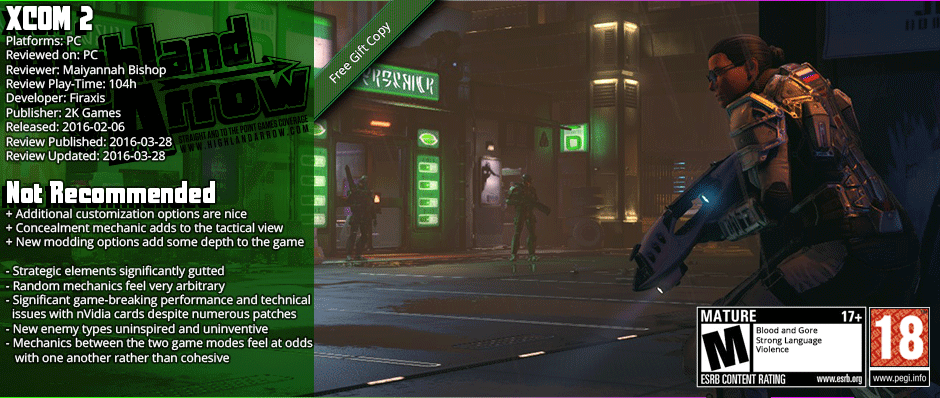

XCOM 2 is a dual-mode strategic and tactical squad-based game and the sequel to the popular reboot of the XCOM series, developed by Firaxis Software and published by 2k Games. I have to say, this one kind of crept up on me; like Yahtzee Crowshaw, I try to ignore video game marketing because it can adjust my expectations and colour my experience of the game outside of what the game itself does or is, so it wasn't until near the release date I saw this one about. I have to admit I was a little excited for it: it's predecessor, XCOM: Enemy Unknown, was at the time one of the first games in a long, long time, that compelled me to sit down and play it from start to finish. Ultimately, XCOM 2 did not even come close to that. While it's not a terrible game, I would say it's objectively worse than the original Firaxis reboot in just about every way - the mechanics are clumsier and don't mesh nearly as cohesively (or arguably, at all), the difficulty is even more elastic and polar, the game mechanics are even less balanced, and the game is riddled with technical flaws and bugs. So while this isn't a stinker, and fans of the series and original reboot will probably enjoy it if they don't hit the performance issues, there's a lot to be desired in this second installment.
Before I go any further, let me say one thing: this is the review that really tested my dedication to trying to complete the product before releasing a review, and to be comprehensive, because here we are almost two months later, after numerous false starts where I thought I was safe to put this review up, only to find out there'd been another patch, sighing to myself, and retrying a play-through. If there is one thing that had become apparent over those past months its while the game certainly has improved, it's nowhere near the point that I would feel comfortable recommending it, and now being so long after release, I feel comfortable saying this appears unlikely to change.
The style drags down the substance
If there's one thing that consistently and at some points, completely got on my tits, it's how much the game's auxiliary presentation - things like the action cam, fancy drawn-out animations, expository stops, and so forth - completely bog down the game. Every mission felt like a war of attrition - but not, as you might think, with the aliens versus my operatives, but rather, between my willpower and the game's absolute hard-on for assuming I'm a complete and utter fool. I cast my mind back to playing Far Cry 3: Blood Dragon, where the tutorial mission took the piss out of the modern trend of hand-holding the player through everything by having it come up with obvious 'tutorial' messages every couple of minutes and having the protagonist swear at them in frustration. XCOM 2, however, isn't doing this for laughs, it just assumes that the person playing it is a complete moron, and indeed, I probably resembled some sort of amputee Micheal Biehn with tits from that tutorial section before I got long into the game.
I'm not exaggerating how often it does that, either. You can have a civilian die right in the center of the screen, have a squad mate comment on it even, and no wait, in case those two things didn't communicate that fact to you enough, it will also wrestle control away from you to point you at that civilian's steaming corpse and have Central shout at you for two to four lines of dialogue to tell you, "hey, civilians are dying". I have often observed that there is nothing quite so personally frustrating to me, and I'd probably safely conjecture many other games, than a game that constantly takes control away from the player, and that anecdote is only one of many, many situations where it will. Even with the options to reduce this - disabling 'narrative VO' and 'action cam' - the game still wastes far too much of my time for my own tastes doing sometimes absolutely nothing.
Let's expand on that a little bit. First of all, even if we overlook the fact that a lot of the animations can be overly flashy (normal ones, even, let alone the 'action cam' - and disabling the action cam doesn't disable those animations by the way, just where it moves the camera), the problem I was consistently having was that after each enemy animation, there was a good 5-10s pause as the game processed whatever - artifical intelligence code I'd wage - and this added up real quick when you got into big engagements with several enemies, to the point where quite honestly, I ended up parking my iPad on my desk to mess about on Twitter and other sites in between my own turns. And I don't know how many times I need to say this, but obviously it's at least one more time: any game where you end up having to entertain yourself during it, is ostensibly a game that has failed in some aspect of its execution. In this case, frankly, XCOM 2 is just burning my time in waste with all this auxiliary presentation. Hell, the original UFO Defense and Terror from the Deep had 'fast enemy turns' as an option, so if we are really striving to find a game that's a streamlined experience, why can't the game peel itself away from the its fancy flair?
A frustrating side thought here is how disabling the action cam, or "narrative" VO, and other secondary presentation options doesn't actually stop the secondary presentation or the constant interruptions. They still proceed. In the case of the former, you just don't get the camera pulled down so frequently to watch the shots. They're still happening, and still slow down the game tremendously. Compare and contrast this to the x-ray camera options in Sniper Elite III, which allowed for a great deal of fine tuning in how often you wanted them to appear, so that you could customize the frequency of when these appear to your individual tolerance. XCOM 2 has no such option, ultimately, you just get to choose how specifically it wastes your time.
The bottom line is this: the fact that the game draws out this secondary presentation so much and often just freezes while its terribly-optimized code tries to compute physics or AI, made completing the game a slog for me. This review got delayed two weeks because that's how much it added to the game time to deal with it and the technical issues. Yes I'm going to bang a lot on that drum a lot, dear reader, because if nothing else, I refuse for it to be just my time that got wasted with it. Net effect of all of the secondary presentation becomes like an obnoxious child yanking the controls from your hands constantly, almost every minute, as if to say "stop! LOOK AT THIS!" - and frankly, it doesn't matter how neat the thing you're asking me to look at is, if you keep shoving it in my face, I'm going to tell you to stop doing that, please. It's tiresome to the point that I'm pretty sure hearing a line starting with "commander" is going to end up being one of my triggers now. I'm only half-joking, as that dialogue quickly became a button labelled "pause game, raise May's blood pressure."
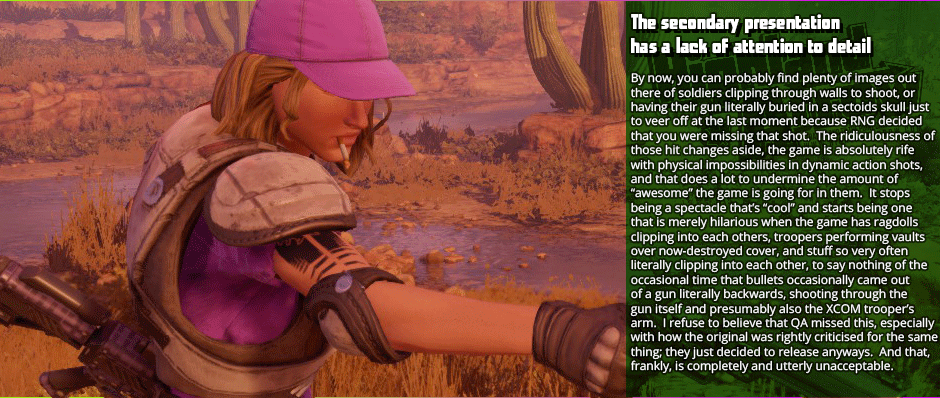
Without the style,
XCOM 2 is a lesser game than its predecessor in many ways
That's the uncomfortable answer for why it limits how much of that flair you can dial back: without it, you would be at danger of realizing that XCOM 2 has cut back a lot from the original XCOM. It feels like the developers of XCOM were desperately trying to get rid of excess weight in some sort of effort to not capsize or the like, but the game's central themeing is as bothersome to me because most of the changes that were made to be thematic, I would say come at the detriment to the game. Obscurement is the only one I feel improves things, however it hardly does so near enough to offset the losses in other parts of the game. "Geoscape" - which is to say the strategic element suffers the worse. Originally, I ranted and rambled that it felt pared back compared to its predecessor, but as time went on and I got deeper into things I realized that's not the case per se, rather, it is as complex as the previous game, but it eschews player choice and careful planning in the pursuit of "streamlining" - so rather than having to worry about the careful balance of country panic levels, which was arguably one of the most central mechanics of both the original UFO Defense and the reboot, you are simply pit against a timer.
So to put this in another way, the mechanics are still as complex, what's gotten cut back, is player agency, and in a game that is supposedly as based upon strategic and tactical skill, that is an exceedingly bitter pill to swallow indeed. The strategic element of the game in particular suffers grievously with these cutbacks, sorry, I mean "streamlining". I was put in mind of a board game with XCOM 2's strategy element, and while that's not necessarily a bad thing, the game kept taking me out of the experience with the mechanics. Rather than having to rely on your fixed budget and the occasional sales of lazer weapons and similar to make money, you can at any time just go and scoop up a supply drop - the contents of which are basically random - yet another hazard RNG puts across the tracks of gameplay.
I'm reminded of a section of my play in the game where I completed a vital mission, finally 'hacking' a foe for vital intelligence that literally wiped half of the alien's progress towards that doomsday event that hangs over you like a proverbial sword of Damocles, just for the game to go "haha, psyke!" and then drop random events on me that all but erased that progress. XCOM 2 is rife with such elements, and that is, ultimately, why the feeling of agency is no longer there in all but the most token of ways. Events play out with such randomness in spite of your actions that beating the game does not feel like a test of skill or strategy, but rather of my ability to put up with the random nonsense that it constantly dumps on me. You don't beat the game because of some great skill or master strategy, you beat the game because you had the dogged determination to continue playing in spite of the fact that the game constantly screws with you. While this may represent a sense of accomplishment to some people, it does not, to me.
XCOM 2's difficulty is very polar
There are probably some of my readers out there whom have been playing this may marvel at how hard I come down on XCOM 2 for these design decisions, thinking to themselves "I didn't find it that hard at all!" And see, that's the problem of the game's over-reliance on the RNG: you lose the ability to control the user's experience with the game. Due to the game being so centered around those invisible dice rolls behind the scenes, there are going to be players whom go on the highest difficulty with ease, and those whom play easy, and still have a hard time, and neither will be a fault or strength of either, merely how the numbers fell.
In the tactical view, get used to seeing sure-shots like having the gun buried in a sectoid's chest miss with infuriating regularity if the RNG doesn't like you, because it can, will, and does happen. My favourite instance of this was getting three attacks with a sniper via perks to hit a melee enemy a tile away, "99%" chance to hit, and every single one missing. And when I'm only taking shots with 80% or more chance to hit and then get to the mission review screen to see my hit percentage was lower than 1/3 of the shots taken, it's hard to feel the game's being honest with me. Part of the problem here becomes how opaque the game is with what affects hit chances. While it does give you a rough indication of what modifiers there are, this mostly revolves around range and cover, and compensates little for what abilities you or the enemy have, special modifiers, and more. I'm starting to regret wishing that the original UFO Defense wasn't as open with modifiers as it was in it's documentation, because here we are essentially on the other side of the fence by way of the game essentially lying to you about them, and even without that dishonesty, vague modifiers make it all the more difficult to feel like you have any sort of a handle on those proverbial dice.
This is all the more frustrating to me because with how the RNG easily snowballs in either direction, there isn't a feeling that I have any leverage over that RNG, especially at the strategic level. You basically are just left with those tri-choices that the game constantly nags you with like a doting mother on her child's first day of school, and that's about it other than choosing which of the random drops you want to fly to, to get interrupted with another tri-choice before you can finish anyways until you're left wondering why you bother with them to begin with. Eventually this starts to come off as extremely condescending. Part of any strategic game is it has to offer the change for you to fail if your strategy is unsound, and learn to make sacrifices to achieve strategic goals. The game is so very afraid that you might fail though, that any time you choose to skip something you'll get not one, nor even two, but three dialogues to click through letting you know how super important that was. Nevermind if you're playing on the hardest difficulty and need to take on an alien facility to forestall the final countdown, no its really fucking important you stop them from getting a little more resilient armour.
The game is brainless in this sense, and it seems to think you are too. Bluntly-put, by the time I'm rewriting this review now, two months from my initial play, I feel insulted by this game and how little intelligence it seems to think I have. And this isn't "get shit done" angry either, this is the "I really wish I had this on CD/DVD so I could watch it die a sparky death in the microwave" angry. And I haven't felt that mad about a game since Spacebase DF-9. Quite a while indeed.
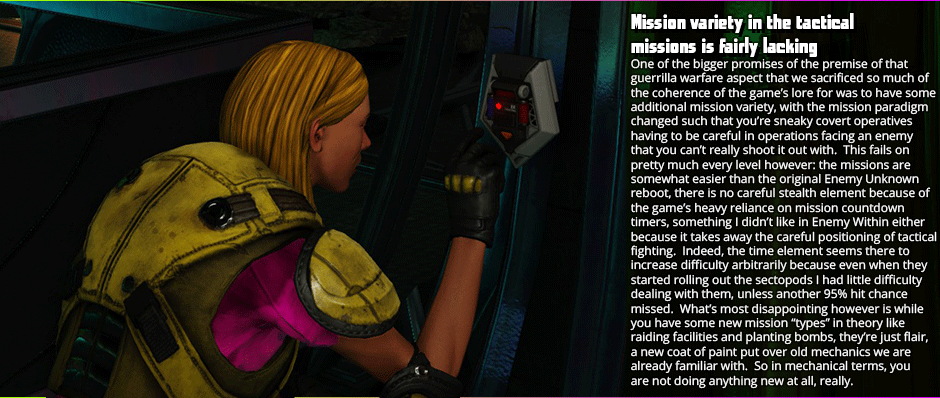
There's a few mission types on offer beyond the scripted sequences: downed UFOs, which are much rarer since interceptions got the cut in strategic mode but they do appear and are immediately familiar, facility raids, supply train raids, VIP rescues or captures, and intelligence disruption or defense. Players of Enemy Within, the expansion, will indeed find most of the mission types the game would otherwise call "new" familiar, because it's essentially that same familiar mechanic: you have a thing (intelligence, supplies, etc) that you have to get to before the timer. XCOM 2 clumsily tries to raise the stakes by requiring you to evacuate your entire squad before the timer elapses, or lose the squad members left behind. This leads to one of the more neglected new mechanics: captured soldiers, which you then can have offered to you as rewards for future missions basically. Why is it neglected? I literally had to force this to happen, even on the harder difficulty, to explore the mechanic. Unless you're faring particularly poorly on the RNG rolls, I never had any trouble getting everyone to extraction before the timer was out, even when I was trying to be deliberate with positioning and thus not booking it. It's a strange dichotomy: a game that wants to be about positioning and planning constantly forces you to keep making seat-of-your-pants decisions, mostly out of mistaking this for a feeling of difficulty, I think. When the difficulty comes from the game jerking me around though, that's a very artifical and frustrating difficulty indeed.
One big thing I started to really notice in XCOM 2 as well is that you double down on the lack of variety too: the areas in which the missions take place start seeming very "samey" very quick. In theory we should have all manner of different locations since we are travelling across the globe in our mission to snuff out the oppressive alien menance and regain humanity's freedom, but you wouldn't know it. Evidently, the alien occupation has managed to do what even the massive globalization of the internet did not, and turn each and every culture into an identical-looking, -feeling, and -sounding locales. I counted maybe five different "sets", not including the story missions, and none of them really feel very "alive". While this is a problem somewhat carried over from the original reboots, it didn't matter so much because the proc-gen sets were broken up with missions from the handful of DLC and a few other things, that broke up the monotony of it. XCOM 2 doesn't have this however, and it starts feeling very similar indeed after a while, and somewhat staid; there came a point where it became quite apparent I was just going to have to get used to that similarity in environment outside of the story missions.
Concealment is an interesting mechanic,
one the game does nothing at all with, really
The main addition to the game that is an actual straight-up addition and not the sort of respray job that the "new" missions are is the aforementioned concealment mechanic. Many but not all of the missions in the game start you in "Concealment" where the aliens are not alerted yet to your position, and you therefore can set yourself up to more carefully and surgically strike against them. In theory, this opens up the game to any means of interesting stealth strategies, such as sneaking past alien patrols with a VIP in tow to extract them from an area with a heavy alien presence, or setting up for a lightning raid of enemy supply lines. Unfortunately, this is a promise the game does not deliver upon, and it falls apart in several ways. First of all and most integral to how it falls apart is once you are spotted by a single enemy, this instantly alerts all aliens on the map to your location and there is no way to lose that alert, so outside of a Ranger perk that allows them to remain hidden, one squadmate being detected means the whole squad is now visible to every alien on the map, and without an option to get back into concealment, the net effect is those first 2-3 turns you spend just moving are done without being harassed at some point. Which is nice I suppose, but this wasn't a huge issue in Enemy Unknown/Enemy Within to begin with, and it really blows the promise that the mechanic had. So yeah, to do get to be more deliberate with your setup, but once you go loud, you're stuck with it.
Don't get me wrong, as someone who obviously approaches XCOM wanting it to be a thinking-man's (woman's?) tactical/strategic shooter, the ability to set yourself up in an intentional manner and arrange line of fires and sight as appropriate is something I do appreciate in the game. You are given the option to at least hit the ground with the initial shots in a very planned manner and it allows you some time to scope out the battlefield and determine routes and approaches, which somewhat alleviates the proverbial Sword of Damocles that the game hangs over your head in the form of that mission turn timer and time limit. Even without that, it's nice and more importantly an integral element of the genre to be able to do so.
Ultimately, I feel that the Concealment mechanic could have been used to pace missions better, which indeed is the problems missions have in my eyes. Once the first shot is fired, it's a constant balls-to-the-walls slugfest from first shot to last, and this actually somewhat dullens the significance of the choices the game presents you with. It becomes constant white noise in a fashion, when the game is constantly going "THIS WAS IMPORTANT, OH SO WAS THIS, AND ALSO THIS". If the tactical missions has peaks and valleys, as it were, moments to catch your breath, that would be the opprotune time for Central to mention the civillian losses, and indeed give us a sense of the horrors of war seeping in as we're given time to collect ourselves and reflect on the action that we just seperated ourselves from. Indeed, XCOM 2 seems so deathly afraid that it might lose our attention that it constantly is dragging us back into the action, which ultimately feels like the reason that Concealment takes a back seat as a mechanic, and to speak frankly, it seems to the game's detriment. It spends so much time and attention on the spectacle of the whoosh-bang-kapow funtimes that it loses much of the potential for the deep and powerful mechanics that it came so close to actually having.
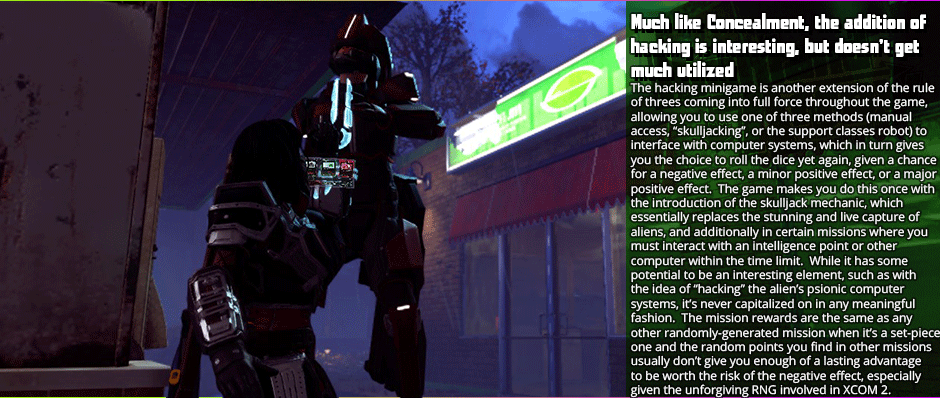
The mind boggles with the way that both concealment and hacking could have been made into much more integral game mechanics, a careful approach of selected engagements, positional flanking, and misdirection by means of hacking enemy systems and perceptions, to avoid gunfights with a more numerous and well-armed foe that the game presents us with, thematically if not mechanically since your operatives will rapidly outclass most enemy foes. Alas, however, this is not the game that we received, merely the game that we could have had, and I dare say it would have been a much better one for it.
Enemy Variety is Fairly Low
I've spoken on a lack of variety on a couple occasions already in this review, and it extends to the enemies you face as well, which mostly come down to human troopers in armour for the first third of the game and the same handful of alien unit types through the rest. The human enemies in particular are all of uniform design, which perhaps works thematically since the game explains they're basically vat-grown types (it's a deeper explanation than that but I won't spoil) - but that does nothing to change the monotonous nature of shooting the same guy in generic black power armour for the five-hundredth time.
Allow me to expand. It's not that there aren't several new types of enemy, some inspired by the original XCOM such as the return of the proper 'snakeman' enemy (or should I say snakewoman?), it's just that they feel, much like the set-pieces, very visually-repetitive. For instance, while there are four different human enemy types, they all look very similar, and this certainly doesn't help when the game copy-pastes them with 'advanced' variants that are literally the same thing with more health tacked on. I can't say it's lazy, because these are high-poly and well-textured models that obviously some care was put into, but it does feel very uninspired. These are basically the same 8 enemy types when it comes to humans, each with one and exactly one thing that stands them out from the others. You don't even get the benefit of the heavier troopers looking like they're in heavier armour, and it still feels like Team Fortress 2 is the only game that grasped that to make the enemies truly easily identifable is to give them different outlines. You couldn't tell a shock trooper from a normal trooper at a quick glance unless you happened to spot the difference in weapon that one carries from the other. It feels like more work could have been done on the human enemies, especially in the department of making them look different from one another.
Moreover, the other problem I have with enemy variety is that on any given mission you'll only see at most a handful of different enemies (and 2-3 of them will often be different human enemies). So while you could have harrowing combinations of the interesting new 'Gatekeeper' alien with sectoids and snakemen for catastrophic combinations of status ailments that would push the squad to it's very limit in a firefight and represent a real, non-artificial challenge to the player in that sense, it feels like the game never quite has the balls to do that, save for the very final mission. Like the difficulty of the game, this makes the enemy variety polar in a sense as well: you go from seeing the same returning enemy troops to everyone and their dog in that final mission. Which is no mark against the final mission, indeed, the final mission should, in my opinion, feel like a recap or "final exam" if the game, the problem here is in the intervening time - you're just not going to see many of these enemies between then. Along with adding to the pervasive monotony of the game, this also presents an issue in that (especially ironically at lower difficulties), you won't have encountered some of the enemies enough to really understand how they fight and how to defeat them, so it becomes a final exam where the teacher forgot a few course units. It's a little disappointing though, that the game could have variety in this context, it just seems to elect not to.
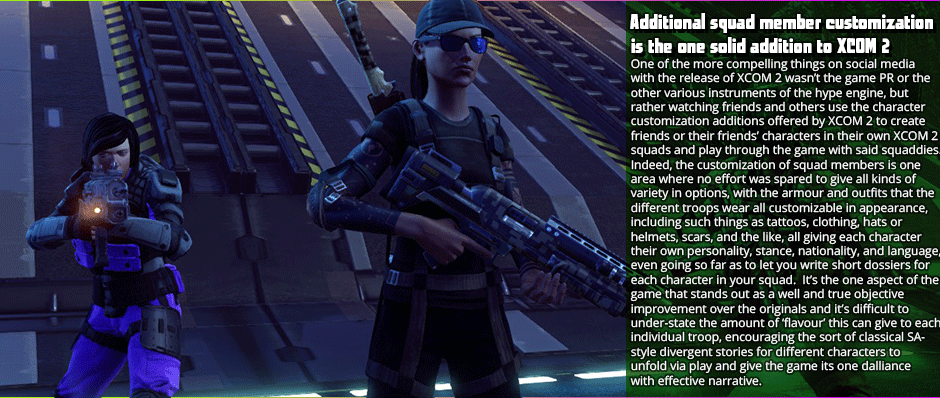
This isn't without its own flaws however: the various different geometries of the different armours and builts leaves animations decoupling a lot, and a lot of general clipping problems start to crop up as you as you unlock various outfits and stuff. Having to unlock something like a ballcap or cigar to give a character also seems a needless thing, and means that a lot of the character customization is something you can't enjoy until that character is fairly-high-ranked. In general there's a certain lack of attention to fine details. You can have bullets "miss" while actually physically connecting with the model because it's part of the customization for that character, for instance, and it could have used some more attention.
A neat feature that plays into that sort of divergent narrative story-telling is the ability to export and share your troopers with friends and others online, though this is nicer in theory than in practice since I found it fiddly get to work right, and you lose DLC or mod customizations in the export - even if the other player also has the DLC or mod (hell, even if you do - you'll lose it on subsequent plays if you try to get your character back.) This seems like something that could have been easily overcome with checks to see if the assets also exist on the importing machine, but no such facility was added. Nonetheless, it's a neat feature and a solid add to the one stand-out aspect of XCOM 2.
The Mod Capability Isn't that Impressive
Modding is the altar upon many sacrifices of the XCOM experience were made - many things were changed, cut, or passed over because of the team wanting you to be able to modify any aspect of the game. What we got out of this was a Peter Molyneux-like over-promise, though, unfortunately. It's not that the game doesn't let you do just about anything, it's that anything but the most cursory of changes (adding cosmetics or "voice packs") requires a significant amount of programming expertise. You aren't going to get anywhere without a working knowledge of programming because the game isn't presented with any actual modding tools, but rather with a SDK, and one that compared to say the original Half-Life's, is frankly pretty poorly-documented and threadbare in comparison. So sure, there's hooks to do just about anything, and I have no doubt there will be some interesting mods, but as it stands right now, the road to getting to any sort of really-interesting mod is so arduous that I don't exactly see it sprouting out a mod community with the sort of ubiquitiousness that the Bethesda Elder Scrolls games have, for instance. Say what you will about Skyrim or Oblivion, the mod tools there have become something of the benchmark by which other games' tools are measured, and there really is no comparison between this and XCOM 2's - the TESCK blows XCOM 2 out of the water. It's much easier to do almost anything in the game in comparison, and XCOM 2 really doesn't give you much aid in doing whatever it is you want.
And that's not to comment on the issue of stability: the game's technical problems come back with a vengance in the context of mods, where as of time of writing I can find at least a handful of threads on reddit and the like about the tools like the "Tactical Debugger" crashing without even a mod loaded, let alone when you're trying to reconcile many mods, the classic bugbear of modding through the years. Getting the mod that removes the various game-enforced pauses is almost a must to play the game, but also to develop, since otherwise you're going to run into "the turn that never ends" rather frequently trying to change to the games actual mechanical logic.
There's also a feeling that a lot of what was cut was left for modders to restore if they liked it so much, and I mega-loathe that attitude. It's exploitative of the fanbase and the kind of thing that's done by a corporation that'll have the stock IVR 'your time is important to us' line while all the same screwing you as hard as they can get away with. Let's call it for what it is: lazy. And that's at best. There's so much this game could have been, and that's not on the modders, that's on Firaxis, whom a friend of mine paid almost 80 dollars to buy this game from for me as a birthday gift.
Accessibility Notes
- Buyer Beware: Significant framerate drops and driver stalls on nVidia graphics cards, even very powerful cards such as the Titan, have been reported, and I personally suffered from many myself.
- Alt-tabbing to desktop often causes the game to absolutely chug on frame-rates until restarted.
- Game plays fine on multiple-monitor setups.
- Excessive amount of explosion and related effects and other flashing light patterns are probably an epilepsy risk.
- Game UI could be difficult to read at high resolutions; it doesn't seem to scale properly (or enough, at least.)
- Game cutscenes and other voiceover are captioned.
- Resolution support middling, with many off-standard resolutions not properly supported.
- Options for graphical fine-tuning are minimal.
- Playable with controllers.


